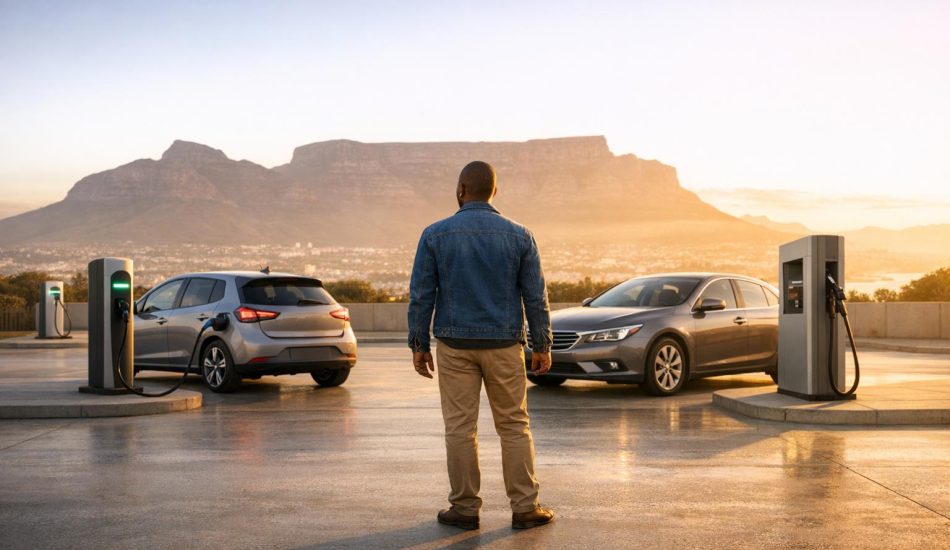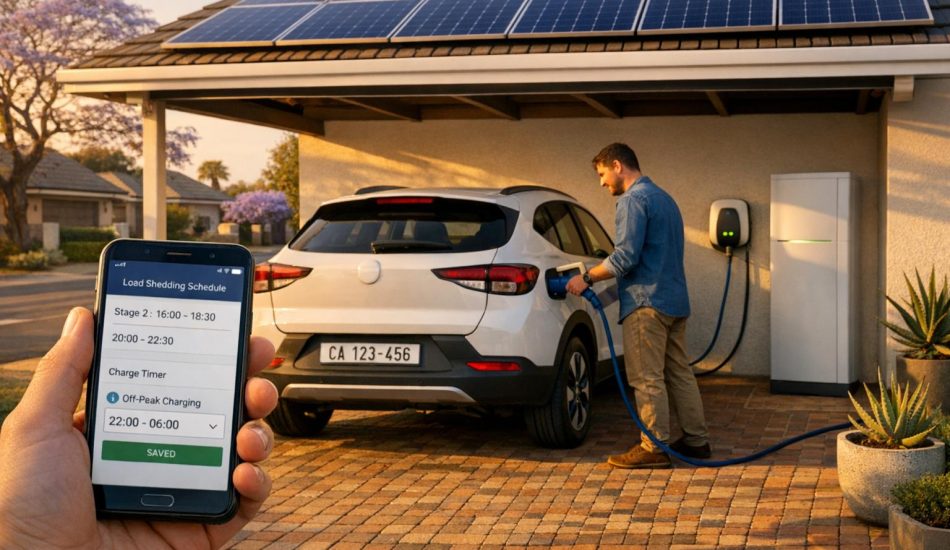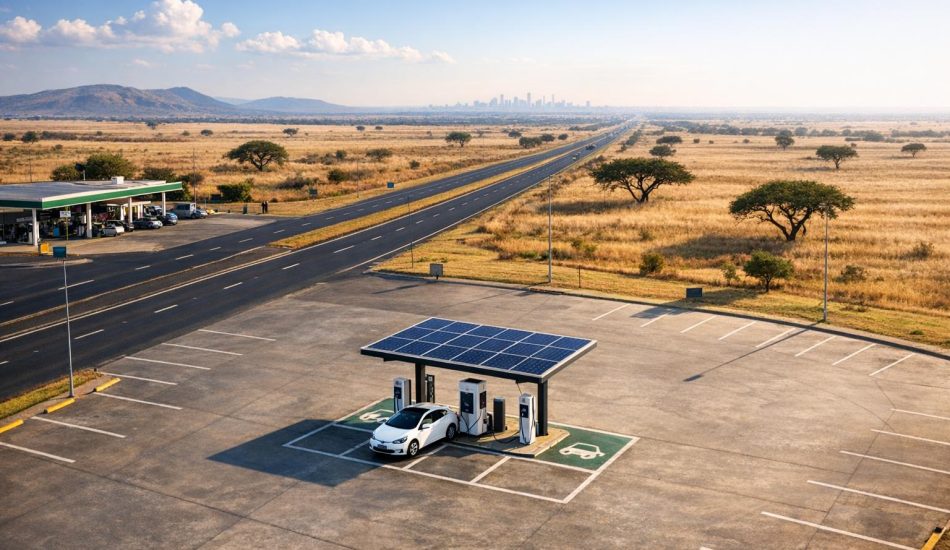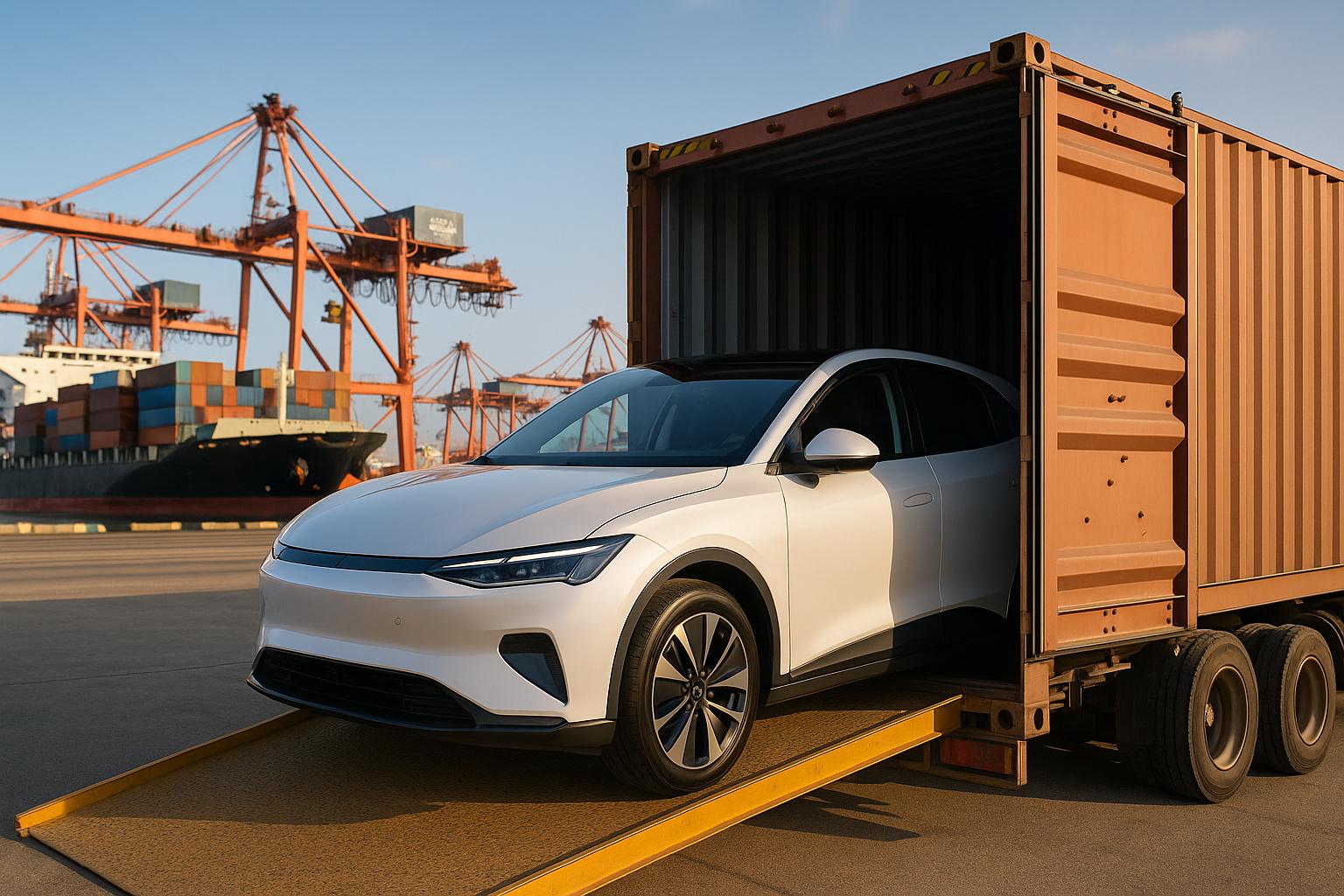
Importing electric vehicles (EVs) from China to Africa in 2025 is easier and more cost-effective than ever, thanks to growing demand, favorable trade policies, and competitive pricing from Chinese automakers. Here’s what you need to know:
- High Demand for EVs: African countries like Ethiopia, Ghana, and Kenya are adopting policies to promote EV imports, such as tax exemptions and reduced duties.
- Top Chinese Brands: BYD, NIO, and Geely dominate the market with affordable and premium EV options, supported by strong after-sales services.
- Cost Savings: China’s zero-tariff policy for 53 African nations reduces retail prices by 20%-40%. Shipping costs and local incentives further lower import expenses.
- Shipping Options: Choose between RoRo (faster, lower cost) or container shipping (better protection for high-value EVs).
- Key Documents: Prepare essential paperwork like invoices, certificates of origin, and inspection reports to meet local regulations.
Platforms like EV24.africa simplify the process by handling supplier verification, logistics, and compliance, making EV imports accessible for individuals and businesses alike. Keep reading for a step-by-step guide on navigating regulations, choosing suppliers, and managing shipping logistics.
African governments welcome Chinese electric vehicle imports, production amid looming trade war
Import Rules and Regulations for Electric Vehicles in Africa
As of 2025, African nations have developed distinct rules for importing electric vehicles (EVs), blending incentives with strict safety and compliance standards.
Import Requirements by Country
Nigeria has introduced enticing incentives for EV imports. Electric vehicles are fully exempt from both the Import Adjustment Tax (IAT) and VAT, making them a more attractive option for buyers. With an 18.9% growth in new vehicle sales in 2023, the market demand for EVs in Nigeria is on the rise. To import an EV into the country, you’ll need the following documents:
- Business registration and tax ID
- Vehicle inspection certificate (from China or a certified third-party inspector)
- Final invoice with precise pricing details
- Certificate of origin outlining a detailed pricing breakdown
- Packing list
- Ocean Bill of Lading
- Marine insurance certificate
- SONCAP approval, which includes a Product Certificate (PC) and a Shipment Certificate (SC) for customs clearance
Malawi has taken significant steps to encourage EV adoption. In July 2025, the government reduced import duties to 0% and lowered VAT on EVs to 8%, down from the previous 16.5%. Additionally, EVs with power ratings under 100 kW are exempt from excise taxes, and there are no age restrictions for imported EVs, unlike traditional combustion vehicles.
"The new regulations in Malawi are designed to encourage clean transportation and make electric vehicles more accessible to the public." – Malawi Revenue Authority
These changes have reduced import costs by 30-40% compared to earlier years, positioning Malawi as one of the more affordable African markets for EV imports.
Other countries, like Kenya and Morocco, have their own frameworks. Kenya requires specific documents for EV imports, including a Certificate of Conformity (COC) from a KEBS-approved agent, a PVOC Certificate to ensure compliance with Kenyan standards, and a Proforma Invoice for accurate tax calculations.
Morocco, under its 2025 green vehicle incentive program, allows qualifying EVs to bypass the 20% VAT, significantly reducing import costs.
Here’s a quick summary of key tax incentives and documentation requirements:
| Country | Tax Incentives / Duties |
|---|---|
| Nigeria | 0% IAT and VAT |
| Malawi | 0% import duty; 8% VAT; zero excise tax for EVs under 100 kW; no age restriction |
| Kenya | Specific import documentation required; no additional tax incentives detailed |
| Morocco | Qualifying EVs exempt from 20% VAT under green vehicle incentive program |
Shipping costs also play a role in overall expenses. For example, shipping an EV from China to Nigeria typically costs around $600 per container via ocean freight, with an additional $1,000 for inland transport and port fees.
Safety Standards and Vehicle Approval
Meeting safety standards is just as important as having the correct documentation. Each country enforces stringent requirements to ensure EVs meet local regulations.
In Nigeria, EVs must comply with Euro II emission standards. The Standards Organisation of Nigeria Conformity Assessment Program (SONCAP) requires thorough testing, including both a Product Certificate and a Shipment Certificate for customs clearance.
"To avoid significant complications, ensure all imported electric vehicles for Nigeria strictly comply with regulatory and safety standards." – Charge Ninja
Failure to adhere to SONCAP standards can lead to import rejection, resulting in delays and extra costs. Comprehensive pre-shipment inspections, covering critical components and build quality, are essential to avoid such issues.
Similarly, under Morocco’s green vehicle program, EVs must meet specific technical requirements to qualify for tax exemptions.
Collaborating with local regulatory authorities or experienced agents can simplify the certification process and help ensure that all documentation is accurate and complete. The Africa EV Readiness and Impact Index, launched in 2025, evaluates how prepared African nations are for EV adoption, emphasizing the importance of tailored policies and infrastructure development.
Proper pre-shipment preparation is key. Securing a vehicle inspection certificate in China and ensuring all electrical components meet local standards can help avoid customs delays. Consistency across all certificates and invoices is critical to keeping the import process smooth and efficient.
How to Find Reliable Chinese Electric Vehicle Manufacturers
Selecting a trustworthy Chinese EV manufacturer is crucial for a successful import operation. Focus on companies with a proven history of exports, recognized safety certifications, and strong after-sales support to ensure a smooth experience.
Here’s a breakdown of some of the top manufacturers and their standout models to help guide your decision-making.
Best Chinese EV Manufacturers in 2025
BYD has secured its position as the world’s largest EV manufacturer, selling an impressive 1.76 million EVs in 2024. The company began operations in South Africa in 2023 and has actively pursued partnerships and competitive pricing strategies, making its vehicles an attractive choice for Africa’s growing demand for affordable mobility solutions.
NIO is a leader in the premium EV market, thanks to its innovative battery swap technology. The ET7 model, featuring luxury design and state-of-the-art technology, is a compelling option for importers targeting high-end buyers.
Chery has shown a strong commitment to the African market by planning local manufacturing facilities to support regional exports. The company is exploring partnerships and establishing production plants in South Africa to cater to local demand and simplify exports across the continent.
Great Wall Motors (GWM) and SAIC have also made their mark with export operations that emphasize affordability and compliance with global standards, offering practical solutions for the diverse needs of African markets.
EV Model Comparison and Features
Understanding the features and price points of specific models can help you make informed decisions. For example, BYD’s Dolphin is priced at approximately $26,000, offering a balance of affordability and reliability. On the premium end, the Seal starts at around $45,000, catering to buyers seeking advanced features and performance.
For budget-conscious markets, the Dayun Yuehu mini SUV is a standout choice, priced just under $21,899, making it one of the most affordable EV options for Africa.
Meanwhile, NIO’s ET7 appeals to the luxury segment, offering cutting-edge features and its signature battery swap technology. Pricing for this model varies depending on configuration and battery options.
| Manufacturer | Model | Starting Price (USD) | Key Features | Target Market |
|---|---|---|---|---|
| BYD | Dolphin | $26,000 | Affordable, reliable, practical | Mass market |
| BYD | Seal | $45,000 | Premium features, performance-focused | Mid-to-premium |
| Dayun | Yuehu mini SUV | $21,899 | Compact, ultra-affordable | Budget-conscious |
| NIO | ET7 | Varies | Luxury features, battery swap tech | Premium segment |
The impact of Chinese EVs is already visible in Africa. For instance, Moja EV Kenya introduced 100 Neta V taxis in June 2025 and plans to expand this fleet to 500 by mid-2025. This demonstrates the growing acceptance of Chinese EVs in commercial applications across the continent.
When comparing models, it’s essential to evaluate warranty terms, after-sales support, and the availability of spare parts in your target region. Manufacturers with local assembly plants or established distributor networks tend to provide better long-term reliability. As Xn Iraki, Associate Professor at the University of Nairobi, points out:
"Africa is a new market with huge potential, which is the reason it’s appealing to Chinese EV makers."
With top manufacturers and competitive models identified, the next step involves diving into logistics, shipping, and cost structures to ensure a seamless import process.
Where to Buy Electric Cars: Platforms and Methods
Choosing the right platform for purchasing electric cars involves verifying supplier credibility, ensuring secure payment methods, and confirming reliable support. Each sourcing method comes with its own set of benefits and challenges.
How to Find and Check Suppliers
Manufacturer websites are a direct and reliable way to connect with authentic suppliers. Brands like BYD, NIO, and Chery have dedicated export divisions that offer verified contacts and transparent pricing. While these channels are trustworthy, they often require bulk purchases, which might not be ideal for smaller importers.
Verified B2B marketplaces such as Alibaba and Made-in-China provide access to a wide range of suppliers and include built-in verification tools. However, supplier quality can vary significantly. It’s essential to conduct thorough due diligence – request business licenses, export certificates, and references from previous buyers before committing to any deal.
Trade shows and virtual expos offer a hands-on opportunity to evaluate suppliers. Events like the Canton Fair and automotive-specific exhibitions allow importers to inspect vehicles, negotiate terms, and establish direct relationships with manufacturers.
To avoid fraud, always verify supplier credentials by checking registrations, certifications, and export records. For instance, a Kenyan fleet operator successfully imported 20 BYD e6 vehicles using verified channels, benefiting from shorter lead times and clear cost breakdowns.
For those seeking a simpler process, integrated platforms provide a convenient alternative.
Buy Through EV24.africa for Easy Transactions
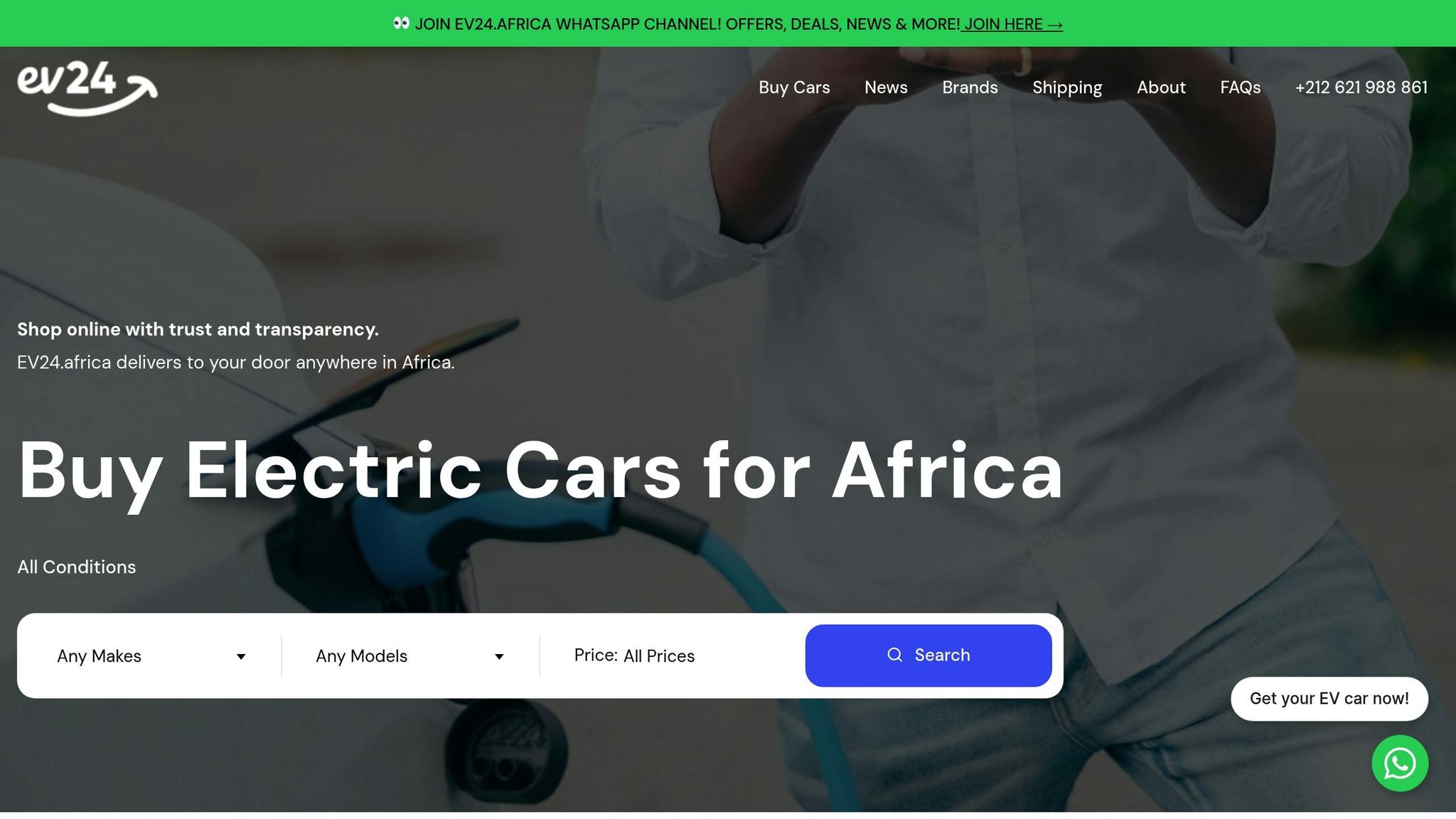
EV24.africa offers a streamlined approach to electric vehicle sourcing, tailored specifically for African importers. This platform simplifies the process by handling supplier verification, regulatory compliance, and shipping logistics on behalf of buyers.
With localized support, financing options, and warranty management, EV24.africa reduces the administrative workload and risks that come with direct sourcing. Unlike traditional methods, where buyers must handle due diligence and customs clearance independently, this platform provides an all-in-one solution.
One standout feature of EV24.africa is its transparent pricing. The platform lists a variety of electric vehicles, with prices ranging from $5,880 for the GEELY PANDA MINI BASE to $85,000 for the ZEEKR 009, catering to diverse budgets. Financing options make even higher-end models more accessible, whether for personal use or commercial fleets.
EV24.africa also offers delivery to all 54 African countries, with both RoRo (Roll-on/Roll-off) and container shipping options, simplifying international logistics. After-sales support is another major advantage. The platform manages warranty claims and maintains local support networks, addressing challenges like service coordination that often burden direct importers.
Many importers in Kenya and Nigeria have successfully used EV24.africa to bring in brands like BYD and Geely, benefiting from faster delivery times and reliable after-sales services. The platform also handles customs clearance and local registration, ensuring compliance with African market regulations and avoiding potential delays.
sbb-itb-99e19e3
Shipping and Delivery from China to Africa
Once you’ve chosen your EV and confirmed your supplier, the next step is getting it shipped from China to Africa. This process involves selecting the most suitable shipping method, preparing all necessary documents, and navigating customs regulations. A solid understanding of these logistics will help you avoid delays and unexpected expenses. Choosing the right shipping method is especially important to balance cost, delivery speed, and vehicle safety.
Container Shipping vs. RoRo Shipping Methods
When it comes to transporting EVs from China to Africa, two main shipping options dominate: Roll-on/Roll-off (RoRo) shipping and container shipping. Each has its own strengths, depending on your budget and priorities.
RoRo shipping allows vehicles to be driven directly onto specialized ships, making it a quicker and often more affordable option. The loading and unloading process is highly efficient – RoRo ships can handle up to 300 vehicles per hour, minimizing port time and reducing handling risks.
"RoRo shipping allows for fast loading and unloading speeds, making it the preferred choice for new vehicle transport." – CEVA Logistics
For example, shipping from Shanghai to Durban via RoRo typically takes about 25 days, with costs ranging from $3,500 to $4,500 per vehicle, depending on the ports involved. In August 2025, CEVA Logistics reported that a 10,000-ton RoRo ship could carry up to 5,000 passenger vehicles from Shanghai to Durban in approximately 25 days.
On the other hand, container shipping offers better protection by securing the vehicle inside a container. This method is especially popular for high-value EVs, as it shields them from weather and transit-related damage. However, it generally takes longer – 30 to 40 days – and involves slightly more complex logistics. The cost for a 40-foot container typically ranges from $3,000 to $3,500.
| Shipping Method | Cost Range | Transit Time | Key Advantages | Main Drawbacks |
|---|---|---|---|---|
| RoRo | $3,500–$4,500 | 25 days | Fast loading/unloading, economical | Less protection for vehicles |
| Container | $3,000–$3,500 | 30–40 days | Superior vehicle protection | Slower and more complex |
The choice between these methods depends on your vehicle’s value and timeline. If you’re shipping a high-value EV, container shipping’s added protection might be worth the extra time. For standard models, RoRo shipping offers faster and more cost-effective transport. Once you’ve selected a shipping method, the next step is preparing the required documents to ensure smooth customs clearance.
Required Documents and Customs Process
Proper documentation is essential for clearing customs without delays or additional costs. As China’s automotive exports to Africa surged by 65% in 2024 – driven largely by electric vehicles, which made up over 30% of that growth – paperwork requirements have become more standardized.
You’ll need the following shipping documents:
- Commercial invoice: Details your vehicle’s specifications and pricing.
- Packing list: Provides an itemized overview of the shipment.
- Bill of lading: Serves as both a receipt and a transportation contract.
- Certificate of origin: Confirms the vehicle’s Chinese manufacture, which may qualify it for trade agreement benefits.
In addition to these, compliance documents are crucial. You’ll need an import permit from the destination country’s trade authority and vehicle inspection reports to verify compliance with safety and environmental standards. For EVs, an environmental compliance sheet is necessary to meet regulations for transporting lithium batteries.
Customs requirements vary widely across African nations. For instance, Ethiopia’s February 2024 ban on fuel-powered car imports has opened the door for more Chinese EVs but also introduced stricter compliance rules for electric vehicles.
Tax policies also differ by country. In Ethiopia, for example, completely built units (CBUs) face a 15% import tax, while semi-knocked down (SKD) kits are taxed at 5%. On top of that, a 15% VAT applies to all imports. Knowing these distinctions is crucial for accurately calculating your total import costs.
"The port-to-port service model for shipping Chinese vehicles to Africa allows sellers to focus on international transportation while buyers manage local logistics, enhancing efficiency." – Trust Freight
To avoid potential issues, consider working with experienced freight forwarders. These professionals can help you navigate the documentation process, minimize errors, and stay updated on ever-changing regulations. Some countries may even require additional certifications or impose age restrictions on imported vehicles. Staying informed about these evolving rules is key to a smooth import experience.
Total Cost Breakdown for Importing EVs
Understanding the full cost structure is essential for planning your EV import effectively. The total price involves much more than just the vehicle’s sticker price – it includes shipping, duties, taxes, and administrative fees. With Chinese car exports to Africa hitting 222,000 units between January and May 2025 – a 67% increase compared to the previous year – many importers are looking for clarity on these expenses. Here’s a detailed breakdown of each cost component, along with examples to help you better understand the numbers.
Cost Components: Vehicle Price, Duties, and Shipping
The total landed cost of your EV is made up of several key elements, which can vary based on the destination and type of vehicle. The starting point is the vehicle’s purchase price. For Chinese-made EVs, prices typically range from $8,000 to $12,000, whereas other brands often cost between $15,000 and $20,000.
Shipping is another major expense. Depending on the ports and shipping method you choose, costs can range from $2,850 to $4,500. For instance, shipping via economical routes from ports like Xiamen and Dalian to South Africa costs about $2,850, while shipping from major hubs such as Shanghai, Shenzhen, and Guangzhou is closer to $3,500.
Import duties and taxes are significant variables. In South Africa, import duties can range from 0% to 100% of the vehicle’s value, and VAT rates fall between 0% and 25%. On top of these, you’ll also need to account for administrative costs, including customs clearance and port fees.
Chinese EVs often have an advantage thanks to SKD (semi-knocked-down) and CKD (completely knocked-down) assembly kits, which lower tax rates in many African markets. Below are examples that break down these costs for popular EV models.
Cost Examples for Popular EV Models
To make this more tangible, here are cost breakdowns for importing Chinese EVs to South Africa, one of the continent’s largest automotive markets. In 2024, new energy vehicle sales in South Africa doubled to 15,611 units compared to the previous year.
Budget EV Import Example:
Let’s consider a basic EV priced at $8,000 with shipping costs of $2,850. This brings the subtotal to $10,850. If we apply a moderate import duty of 25% (about $2,000) and a VAT rate of 15% (around $1,200), the total landed cost comes to approximately $14,050, excluding any additional fees.
Mid-Range EV Import Example:
For a more advanced model priced at $12,000, shipping from Shanghai to Cape Town costs about $3,500. With higher import duties of 45% (around $5,400) and a VAT rate of 20% (approximately $2,400), the total landed cost works out to about $23,300, not including extra fees.
| Cost Component | Budget EV ($8,000) | Mid-Range EV ($12,000) |
|---|---|---|
| Vehicle Price | $8,000 | $12,000 |
| Shipping Cost | $2,850 | $3,500 |
| Import Duties (25%/45%) | $2,000 | $5,400 |
| VAT (15%/20%) | $1,200 | $2,400 |
| Total Landed Cost | $14,050 | $23,300 |
These examples give a clear picture of how the costs add up, helping you align your budget with the logistics and regulations involved. Be sure to account for potential fluctuations in exchange rates, changes in trade policies, and seasonal shipping demand when planning your import.
Staying Compliant and Getting After-Sales Support
Importing an EV is just the first step – ensuring compliance and securing reliable after-sales support is essential to protect your investment. With Chinese EVs projected to account for over 60% of global EV sales by 2025, staying on top of regulations and having access to dependable support will keep your EV running smoothly.
Staying Updated on Regulation Changes
Import regulations in many African countries are often subject to change. Some even require periodic re-certification or emissions testing for imported vehicles, including EVs. To stay compliant, regularly check official government websites and industry association updates in both China and your target African market. Tools like digital compliance platforms and regulatory trackers can help by providing alerts on new safety standards, tax changes, or updated documentation requirements. Keeping organized digital records of import documents and compliance certificates will also make audits or re-certification much easier to manage.
Services like EV24.africa simplify this process with their Full Support & Compliance package, which handles customs clearance and local registration across African markets. Their dedicated WhatsApp channel also provides real-time updates on regulatory changes, ensuring you’re always informed.
Warranty and Maintenance Support
Ongoing support is just as important as compliance. Warranty coverage, for example, plays a key role in maintaining your EV’s performance over time. Leading Chinese brands like BYD, Geely, and Chery typically offer warranties covering battery performance, the drivetrain, and major components for 3–5 years or up to 62,137 miles. Before purchasing, confirm that the EV model has homologation approval in your target market and includes international warranty coverage. Vehicles purchased outside official channels may not qualify for this support.
To claim warranty or after-sales service, you’ll typically need proof of purchase, warranty certificates, and maintenance records. Keep all original documents organized and follow the supplier’s procedures to ensure quick and efficient service.
Many Chinese EVs now feature advanced technologies like remote diagnostics and over-the-air updates, which can minimize service delays. For long-term ownership, consider working with EV24.africa or local authorized dealers. They provide access to spare parts, technical support, and coordinated warranty services, making maintenance far more convenient.
Chinese EV brands are rapidly expanding their international footprint, with projections to capture over 30% of the European EV market by 2026. This growth is driving improvements in after-sales infrastructure, including innovations like battery swap stations and telematics, which are starting to reshape support systems in Africa. EV24.africa enhances this experience by offering a single point of contact for everything from import logistics to ongoing compliance and after-sales support, ensuring a seamless ownership journey.
Get Started with EV Imports Through EV24.africa
Importing electric vehicles (EVs) from China to Africa can be a tricky process, especially when you factor in compliance and logistics challenges. But that’s where EV24.africa steps in. As the first online marketplace tailored for African EV buyers, it simplifies the entire process, making EV imports far more manageable.
Through EV24.africa, buyers gain access to a range of pre-vetted manufacturers, including big names like BYD, XPeng, Leapmotor, Changan, Wuling, Mercedes-Benz, and Tesla. This ensures buyers are connected to top-tier brands in a market where Chinese EVs now dominate, accounting for over 60% of global sales.
"At EV24.africa, we simplify the process of importing and buying electric vehicles in Africa. Our expertise ensures a seamless, transparent, and stress-free experience, so you can focus on driving the future of mobility."
The platform stands out with its transparent pricing, flexible payment plans, and financing options, making EV imports more accessible for small businesses and individual buyers alike. And it doesn’t stop there – EV24.africa also handles the logistics to make the process as smooth as possible.
From customs clearance to local registration in all 54 African countries, EV24.africa takes care of the heavy lifting. Buyers can select shipping options like RoRo or container shipping, with services ranging from port-to-port to door-to-door delivery. Their Full Support & Compliance package provides end-to-end assistance, covering everything from the initial purchase to final registration. This gives buyers the confidence to tap into China’s rapidly growing EV market.
Whether you’re a first-time importer or a dealership planning bulk purchases, EV24.africa offers a comprehensive solution. By combining supplier vetting, financing, logistics, and compliance support, the platform helps minimize risks and administrative headaches, making it easier than ever to bring EVs to Africa.
FAQs
What is driving the surge in electric car imports from China to Africa in 2025?
The rising interest in electric vehicles (EVs) across Africa is set to significantly boost imports from China in 2025. Lower import taxes and streamlined trade rules are making it easier for African markets to access these vehicles.
China’s ability to produce budget-friendly, reliable EVs plays a major role in this surge. Improvements in shipping logistics further reduce costs, making Chinese EVs an attractive option for both businesses and individual buyers in Africa. Combined with Africa’s growing emphasis on eco-friendly transportation, these elements are powering the increasing demand.
What are the differences between RoRo and container shipping for cost and vehicle protection when importing EVs from China to Africa?
When it comes to shipping options, RoRo (Roll-on/Roll-off) is often the go-to choice for those looking to save money. It’s a budget-friendly method where vehicles are driven onto a ship and secured for transit. However, keep in mind that this approach leaves vehicles exposed to the weather and other external factors, offering only basic protection.
On the other hand, container shipping comes with a higher price tag but offers much better security. Your vehicle is placed inside a sealed container, protecting it from the elements and reducing the risk of potential damage during transit.
Deciding between these two options really comes down to your budget and how much protection you feel your electric vehicle needs while being shipped.
What are the key steps to follow for complying with local regulations when importing an electric vehicle into an African country?
To successfully import an electric vehicle (EV) into an African country, it’s crucial to start by understanding the local regulations. Research the specific import rules for your destination, including restrictions like age limits, emissions standards, and any taxes or duties that apply. Make sure the EV complies with local technical standards and that its charging system aligns with the available infrastructure.
Collaborating with reliable Chinese exporters is also key. Look for exporters who are well-versed in the export process and can assist with critical tasks like documentation, inspections, and ownership transfers. Additionally, team up with logistics providers who have experience navigating African customs and port operations. Their expertise can help make the shipping and clearance process smoother and more efficient. By following these steps, you can minimize delays, manage costs effectively, and ensure a hassle-free import process.


